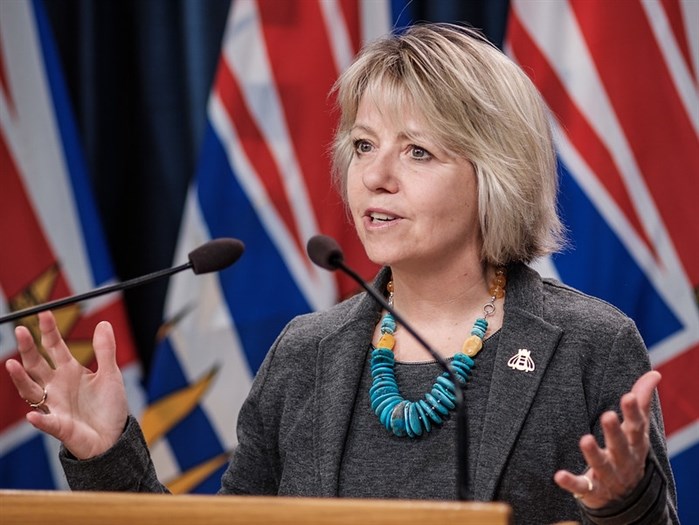
B.C's provincial health officer Dr. Bonnie Henry provides an update on COVID-19 on April 2, 2020 in this file photo.
Image Credit: SUBMITTED / Province of British Columbia
May 04, 2020 - 3:23 PM
B.C. is at the “end of the beginning of this pandemic,” provincial health officer Dr. Bonnie Henry said, but day to day life may not change much in the weeks ahead.
“Physical distancing has made a difference,” Dr. Henry said during an epidemiology presentation today, May 4, that looked at how the pandemic has worked its way through B.C.
“It has allowed us to put the put the brakes on COVID-19, but we haven't stopped the car and it's very unlikely that we're going to be able to do that in the coming months.”
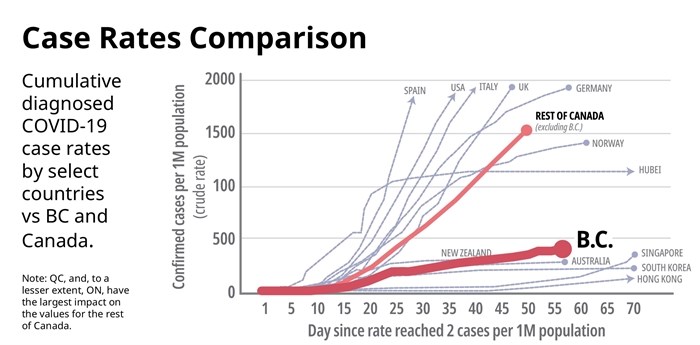
May 4, 2020.
Image Credit: SUBMITTED/BC Government
So, as social interactions stay at the current 30 per of normal, and B.C. eyes opening up to 60 per cent — a number that will allow for social distancing and some resumption of normal life — Dr. Henry said that orders on the number of people allowed to gather will remain at 50, businesses will have to implement measures that make interactions safer and even outdoor visits will remain preferred.
There's so much that remains unknown about this virus and that is not just the case in B.C. or in Canada, but also around the world, she said. Until there is a vaccine social distancing will be the norm.
“The goal in the next months is to make sure that we learn how to live with this virus in a safe way that protects people this year,” she said.
“We don't know yet whether we're going to have a resurgence of respiratory illness when influenza season and respiratory virus season starts again in the fall, that is something we need to plan for, we need to prepare for and we need to monitor for starting now.”
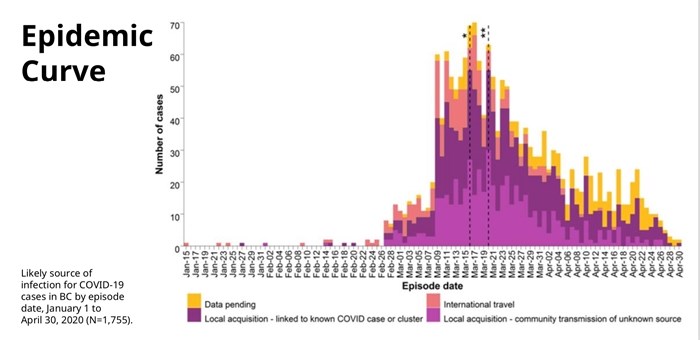
May 4, 2020.
Image Credit: SUBMITTED/BC government
In the meantime, hand hygiene, avoiding touching our faces, coughing into sleeves and disinfecting frequently touched surfaces will remain the norm.
“Those are all things that are needed, and need to stay the same — staying at home and away from others if you're feeling ill, that has to be our new normal for forever,” she said.
Dr. Henry said she has faith that British Columbians will rise to the challenge.
“I think we have seen that people are very concerned about this and we have seen what's happened around the world and people know what we need to do, it's hard and it's been hard on us all collectively to get where we have,” she said.
“So we all collectively have a vested interest in doing the right thing. I've said it many times, I really honestly believe that if we give people the information … we know that most people will do the right thing and I'm convinced that is the case here in B.C.”
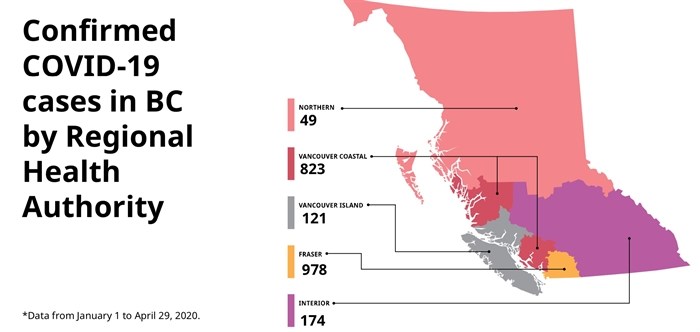
May 4, 2020.
Image Credit: SUBMITTED/BC government
If not, the risks to medically vulnerable people in our families is high, particularly if they are male.
Men in B.C., as has been the case across the globe, are suffering more severe consequences from COVID-19, Dr. Henry said.
Dr. Henry said that across B.C., most people who've tested positive for COVID-19 have been between the ages of 30 and 60 years old, and more women have been affected.
When it comes to hospitalizations, however, there is a shift to the older age groups and men.
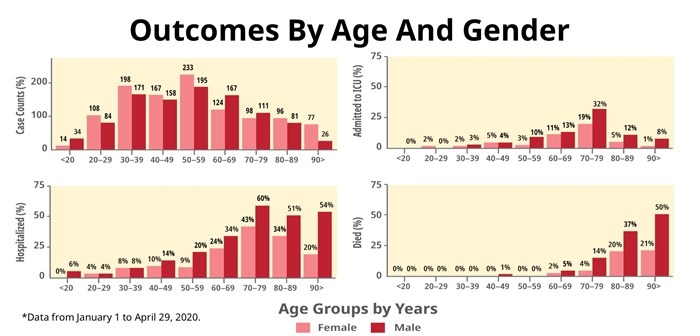
May 4, 2020.
Image Credit: SUBMITTED/BC government
“Most of the people in ICU are in their 60s and 70s and, again, more men than women required that critical care,” she said, adding younger people are not immune. People in their 20s and 30s have required hospitalization and been admitted to the intensive care unit.
When it comes to deaths, the majority have been people in their 70s, 80s and over 90.
“We also have seen that it's much more than half of the men over age 90 have died, whereas it's less than 20 per cent of women,” she said.
“So this is a phenomenon that we're seeing around the world that men are more likely to have more severe illness to require hospitalization and to die from COVID-19, and we really don't understand why there's a lot of work going into trying to understand that phenomenon.”
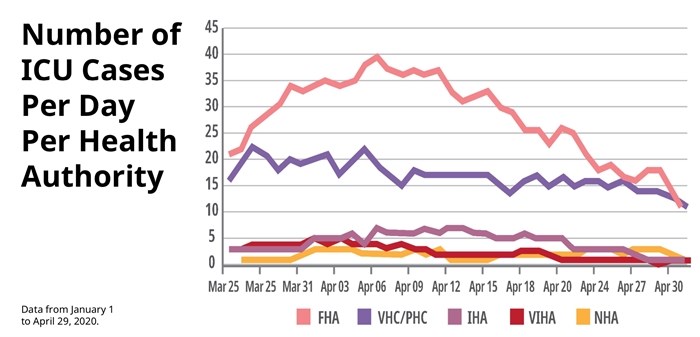
May 4, 2020.
Image Credit: SUBMITTED/BC government
There have been 53 new cases of COVID-19 since Saturday bringing our total to 2,224.
Of those, 845, people are in Vancouver Coastal Health, 1,027 are in Fraser Health region, 124 people were in Vancouver Island Health, 177 in Interior Health and 51 people in the Northern Health region.
Currently, there are 77 people in B.C. who are in hospital with COVID-19 and of those 20 are currently in critical care.
There were also three more deaths over the weekend, all of them in long term care here in the province, bringing the total number of people who've died to 117.
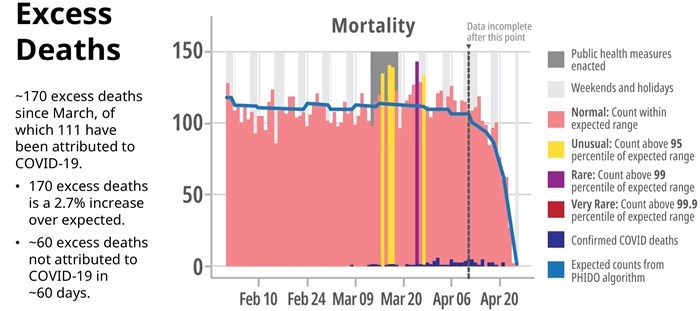
May 4, 2020.
Image Credit: SUBMITTED/BC government
To contact a reporter for this story, email Kathy Michaels or call 250-718-0428 or email the editor. You can also submit photos, videos or news tips to the newsroom and be entered to win a monthly prize draw.
We welcome your comments and opinions on our stories but play nice. We won't censor or delete comments unless they contain off-topic statements or links, unnecessary vulgarity, false facts, spam or obviously fake profiles. If you have any concerns about what you see in comments, email the editor in the link above.
News from © iNFOnews, 2020